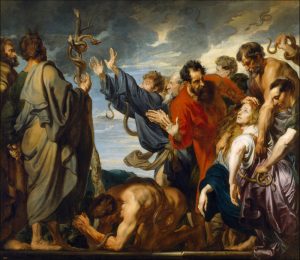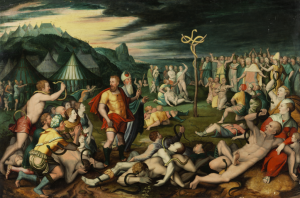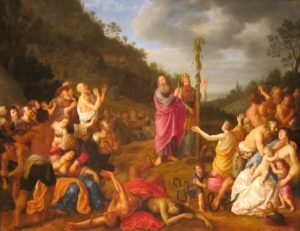Thoughts on Sunday’s Lessons for March 10, 2024 (Lent 4B)

Moses and the Brazen Serpent (1618-1620), oil painting on canvas by Anthony Van Dyck (1599-1641). Museo del Prado, Madrid. (Click image to enlarge.)
First Reading: Numbers 21:4-9
Sunday’s first reading recounts the Book of Numbers’ bewildering account of God sending deadly poisonous snakes to punish an ungrateful people – and a curative bronze serpent that seems suspiciously like an idol. This might strike us as an ancient legend, easily ignored. But then John’s Gospel shows Jesus citing those same verses to set the context for the famous words in John 3:16, which we will hear in Sunday’s Gospel! This makes the serpent story a little more difficult to ignore. Here’s a way to internalize it: When you think you’re surrounded by snakes, look up. Remember that God is with us.
Psalm: Psalm 107:1-3, 17-22
The theme that we hear in this passage from Psalm 107 offers soothing balm after the shock of venomous snakes and bronze serpents in the reading from Numbers. The Psalmist invites us to repent, to turn back, to give thanks for God’s mercy with shouts of joy. Even when we are foolish, when we rebel, when we sin, when we are afraid, these verses offer reassurance: As soon as we cry out for God, God will respond to us as beloved children, granting us healing and salvation.
Second Reading: Ephesians 2:1-10
This letter, likely written to the people of Ephesus and other communities by a later Christian leader writing in Paul’s name, imagines something just about as frightening and potentially deadly as a passel of serpents: A shadowy spirit, a “ruler of the power of the air,” stands ready to lure those who prefer passion and the flesh to a saving life in Christ. Like those healed by gazing at Moses’ bronze serpent, those who follow Christ are saved by God’s mercy and raised up by the gift of grace through Jesus. In words that would inspire some reformers a millennium and a half later, the author of Ephesians declares that we are saved by grace only, not by anything that we do to try to earn salvation.
Gospel: John 3:14-21
“God so loved the world that he gave his only Son, so that everyone who believes in him may not perish but may have eternal life.” For many Christians, this week’s lessons could start and finish right there with John 3:16. But wait! Did Jesus just begin by comparing himself to Moses’ bronze serpent? This passage picks up in the middle of Jesus’s conversation with the Pharisee Nicodemus, who came to visit him by night. Surely Jesus is teaching from the Torah, with which both he and Nicodemus would have been intimately familiar; Numbers is his text. We cannot take John 3:16 out of its context without reading the verses that come before and after. John makes clear that we all have power to choose between darkness and the light. Just as God provided the Israelites a way to repent and be healed, so a loving God offers healing grace to all.



